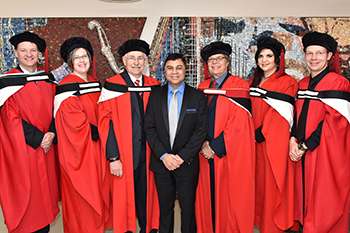
From left to right: Dr Stiaan Lamprecht,
Dr Cornelie Crous, Prof Hentie van Wyk
(Programme Director: School of Accountancy),
Prof Francis Pietersen (Rector and Vice-Chancellor),
Prof Dave Lubbe (Research Fellow: School of Accountancy),
Dr Léandi Steenkamp and Dr Louis Smidt.
Photo: Charl Devenish
This year’s mid-year graduation ceremony for master’s and doctoral degrees saw the School of Accountancy honouring four alumni with PhDs in Accounting on 26 June 2017 at the Callie Human – a record for the School of Accountancy.
Professor Hentie van Wyk, Programme Director of the School of Accountancy and promoter of one of the doctoral degrees, says, “Over the past three to four decades before 2017, no more than five doctoral degrees were awarded by the School of Accountancy.”
Dr Cornelie Crous, Dr Léandi Steenkamp, and Dr Louis Smidt received their doctoral degrees with specialisation in Auditing, and Dr Stiaan Lamprecht with specialisation in Accounting.
PhD candidates’ thesis and personal profiles
Dr Crous, who was born in Bloemfontein on 30 June 1979, is currently working in the School of Accountancy as a Senior Lecturer in Auditing. Her thesis, which is titled ‘Corporate Governance in South African Higher Education Institutions’, influences the application of corporate governance principles in higher-education institutions. It provides a thorough breakdown of the application and disclosure of the application of corporate governance principles in terms of both South African and international best practices in publicly-funded universities in the country.
Dr Lamprecht’s thesis, ‘A Financial Reporting Framework for South African Listed Companies under Business Rescue’, contributes innovative knowledge and insights to the existing body of knowledge on financial reporting. According to his study, with reference to a listed company under business rescue, there is a need for an underlying financial reporting assumption that varies from the recognised going concern and liquidation assumptions. Users of the financial statements of such a company also require an accounting measurement model based on current values, as opposed to the mixed-measurements accounting model employed at present.
Dr Smidt completed both his master’s and PhD degrees at the UFS. This father of two sons is currently a lecturer at the Tshwane University of Technology. His thesis, ‘A Maturity Level Assessment on the use of Generalised Audit Software by Internal Audit Functions in the South African Banking Industry’, has already started to contribute to the internal audit profession in South Africa and globally. Due to its existing extension to internal audit functions in various industries in Canada, Columbia, Portugal, and Australia, the value has been enhanced, as it now provides an internationally correlated set of results.
Dr Steenkamp, who completed her Magister in Auditing with a distinction at the UFS in 2013, is a qualified Chartered Accountant (CA (SA)), Certified Internal Auditor (CIA), Certified Information Systems Auditor (CISA), Professional Accountant (SA), and member of all the professional bodies. Her thesis, ‘The Sectional Title Industry in South Africa: Enhancing Accounting and Auditing Practices’, makes a significant impact on the sectional title industry and the accounting profession in South Africa. The literature review gave an in-depth overview of risks associated with sectional title for various stakeholders (i.e. owners, trustees, managing agents, auditors and accountants, and EAAB-appointed inspectors).
“Indeed a special day for the School of Accountancy!” says an ecstatic Prof Van Wyk. Professor Dave Lubbe, Research Fellow in the School of Accountancy, was the promoter for three of the four doctoral degrees.